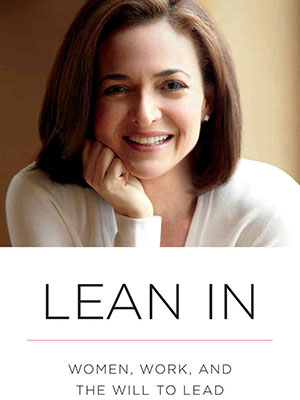 I was determined not to like Sheryl Sandberg’s much-buzzed-about book “Lean In: Women, Work, And the Will to Lead“. Similar to critical articles I read, I questioned why a woman in a position of power and influence, not to mention privilege, would be telling us that women need to be doing…more. It made me tired just thinking about it. What about a company’s responsibility toward supporting women and families through policy and culture shifts? What about asking men to “lean in” and be more thoughtful about their roles and complicity with pay inequity and childcare burdens?
I was determined not to like Sheryl Sandberg’s much-buzzed-about book “Lean In: Women, Work, And the Will to Lead“. Similar to critical articles I read, I questioned why a woman in a position of power and influence, not to mention privilege, would be telling us that women need to be doing…more. It made me tired just thinking about it. What about a company’s responsibility toward supporting women and families through policy and culture shifts? What about asking men to “lean in” and be more thoughtful about their roles and complicity with pay inequity and childcare burdens?
The very title “Lean In” rubbed me the wrong way. It’s not that I don’t believe in women speaking up for themselves; I teach salary negotiation to women, after all, and classes on how to be your own advocate with your career and job search. However, what we don’t need is more weight on our shoulders suggesting that change rests completely on us. So I was angry at Sheryl Sandberg and her book.
And yet, I ultimately decided it’s best not to judge a book by it’s cover, or title and critical reviews in this case, until I’ve read it for myself.
To my surprise, I loved it.
Why? The book is honest about Sandberg’s insecurity and self-doubt at all stages of her career, and guilt over impossible choices she’s had to make around work and family. She speaks directly to men about their roles and is an advocate for positive changes in the workplace. I found myself inspired and thinking about ways I could sit at the literal and metaphorical table more.
One of the validating points she makes is how likability and success are negatively correlated for women, meaning the more successful women become, the less likable they are rated by their colleagues, which is not the case for men. This is illustrated best by the Heidi/Howard research study where the details of a successful entrepreneur are exactly the same and the gender is switched. Both men and women rated the male (Howard) as likeable and the woman (Heidi) as selfish and not someone you’d want to work with or hire. No wonder we’re spinning our wheels trying to navigate the complex mixed signals women receive in the workplace. Sandberg clearly and concisely presents this in the context of her own life including in her position at Facebook.
I agreed with one LYJ alum’s take that “Lean In” is “like all the feminist data you ever wanted in one place.” Not only that, she elaborated: “We agreed after our book club that [“Lean In”] gave us more awareness, the ability to recognize certain ways we hold ourselves back, and courage to make subtle changes.”
I encourage you (and that means men too) to read “Lean In” and decide for yourself where you stand on these critical issues. Be part of the conversation, and let’s keep that conversation going.










Get Social